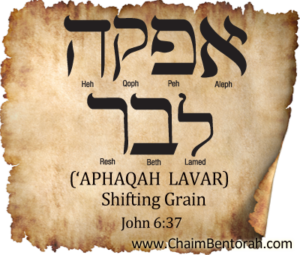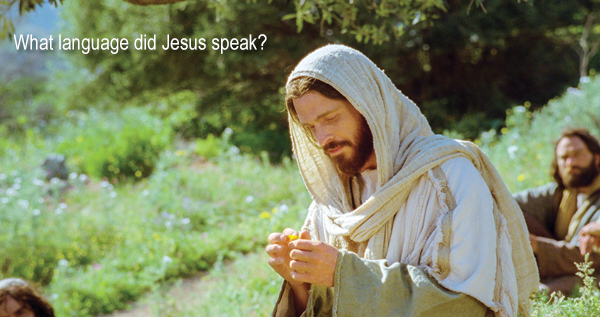Aramaic Word Study – Shifted Grain – ‘Aphaqah Lavar אפקה לבר Aleph Pei Qop Hei Lamed Beth Resh
John 6:37: “All that the Father giveth me shall come to me; and him that cometh to me I will in no wise cast out.”
 I remember as a child I drew a lot of comfort from this verse. I accepted the Lord as my Savior at the age of nine, but shortly after that I began to doubt my sincerity. I wondered if I had really accepted the Lord. Did I really repent? Did I say the prayer right. Was I really saved? I would start “accepting the Lord” every day. I never felt I was really saved. I would rush home from school and if my parents were not home, I would turn on WMBI our Christian radio station. If the station was still on, I knew the rapture had not occurred and I was not left behind (it never occurred to me that a program tape might have been left running).
I remember as a child I drew a lot of comfort from this verse. I accepted the Lord as my Savior at the age of nine, but shortly after that I began to doubt my sincerity. I wondered if I had really accepted the Lord. Did I really repent? Did I say the prayer right. Was I really saved? I would start “accepting the Lord” every day. I never felt I was really saved. I would rush home from school and if my parents were not home, I would turn on WMBI our Christian radio station. If the station was still on, I knew the rapture had not occurred and I was not left behind (it never occurred to me that a program tape might have been left running).
One day I was reading a book by John R. Rice called “Questions and Answers.” There was a question in that book from someone who sounded just like me. Always “accepting the Lord” but not really feeling like she was “saved.” John R. Rice quoted this verse and said something that never made me doubt my salvation since. “God wants you a million times more than you want Him.” Over the years I have found numerous Scriptures and numerous events in my life that have just confirmed this to me. To this day I draw comfort in those simple words which I am constantly finding to be more and more Scripturally sound and from this verse which is still very precious to me.
My confidence in the Heavenly Father is such today that John 6:37 sounds almost ridiculous for Jesus to have to say such a thing. “Casting out” is so harsh. Like many of you I have found the Heavenly Father to be so loving it is almost impossible to imagine that he would “cast out” anyone. Yet, remembering my struggle as I child I still cherish this verse. So do not for a second think I am leaving our literal understanding of this verse as it is too sacred to me to muddy it’s waters. Yet, as I grow in my walk with God I am no long fearful of being “cast out,” but there is something else I fear and again this verse comes to my rescue.
The phrase “cast out” is an old Aramaic idiomatic expression. It is the words ‘aphaqah lavar which literally means to be excluded like shifted grain.
The Greek verb used here is ekballo which means to cast out or throw out, but the phrase cast out is an old Aramaic idiomatic expression. It is the words ‘aphaqah lavar which literally means to be excluded like shifted grain.
Most of us city slickers have little idea what it means to shift grain, let alone the ancient first-century method of shifting grain. After wheat has been harvested the first step in preparing it for use is to shift it or thresh it. What this process does is release the inedible or unusable portion of the grain which is known as the chaff from the usable or edible grain. This recalls that verse in Matthew 3:12: “His winnowing fork is in his hand, and he will thoroughly cleanse his threshing floor. He will gather his wheat into the barn, but the chaff he will burn up with unquenchable fire.”
However, we should give more thought to just what the chaff is. The chaff is that dry, protective covering of the wheat grain. Our first impression is that it is just a nuisance that needs to be burned away. However, it does serve as an important process in the plant’s life cycle. Its chief function is to protect the grain from damage and disease. It also helps the plant to disperse its seeds.
When the wheat is harvested the grain must be separated from the chaff by threshing it. This was done by spreading the harvested wheat on a hard surface and beating it with a club. It then must be winnowed to separate the grain from the chaff entirely. This was done with the winnowing fork which toss the grain into a light breeze. The wind would blow the light chaff away and the heavier grain would fall into a waiting tray or basket and carry into the storehouse. The chaff would then be used as fuel for a fire.
In the Matthew passage of the wheat and the chaff, John was speaking of the scribes and Pharisees who were doing a good job of protecting the grain or the Torah, spreading the Word or Torah, like many preachers and teachers today. They were preserving the faith but they themselves were not embracing the source of the faith, just the position or occupation of preserving and spreading the faith but not embracing it personally. So when the time of harvest comes they will be separated from the message of the Word of God which is Christ Jesus.
I spent a lot of time trying to be saved, worried about being cast out and sent to hell. But in reality, all I had to do was embrace the Word of God in Christ Jesus. I did need to worry if I had the right doctrine, teaching or dogma. I didn’t need to worry if I belonged to the right church, gave my tithe, and attend each church Sunday. I just needed to embrace the Word of God which John taught would be Jesus the Messiah. All I had to do was “come” to him. In Aramaic, that word come is natha which means to join, link up or connect. This word is reflexive that is it means I need to join or connect myself to Jesus. That is to bring me together with Jesus in a connection or sort of like, to hitch up with him like a chain in a link. Where he goes, I will go. Whatever I do, He will be doing it with me. Like a marriage, we will go through this life together and if I do that, He will never separate me from Him, I will be a part of the grain, the Word of God in Jesus Christ. All my religious behavior, beliefs, doctrines, etc., that are not a part of the Word of God will be separated from me but I will remain because I am a part of the grain the Word of God in Christ Jesus, not the doctrines or dogma, the chaff a religious organization.
Hi there! Thank you for reading this Daily Word Study. Can I ask a favor? Share this Daily Word Study with your friends on Facebook and Twitter by clicking one of the icons below.
Thanks & Blessings, it means a lot to me!








Recent Comments